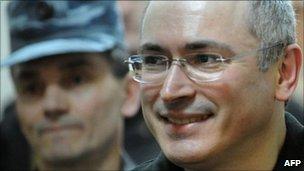Khodorkovsky to be freed in 2014 after sentence cut
- Published

Imprisoned former tycoon Mikhail Khodorkovsky is due for early release in 2014 after a Russian court cut two years off his term for embezzlement.
He is serving his sentence in a prison near the Arctic Circle after being convicted in 2010 at a trial dismissed by supporters as politically motivated.
A Moscow court cited legal changes in reducing the term.
Responding to the news, Khodorkovsky's lawyer said his client was "innocent and should be released immediately".
The former head of oil giant Yukos was convicted of fraud and tax evasion at his first trial in 2005.
Khodorkovsky's business partner, Platon Lebedev, has also had his sentence cut by two years.
At their second trial in 2010, they were both sentenced to 13 years, to run from the date of their arrest in 2003.
In one of his final acts before leaving office as Russian president this year, Dmitry Medvedev ordered a review of the sentences imposed on Khodorkovsky, Lebedev and 30 others.
'Lynching'
Khodorkovsky's convictions have been widely seen abroad as political revenge for him defying the Kremlin by backing Russia's opposition politicians against Vladimir Putin, who was re-elected as president in March after a gap of four years.
Mr Putin himself denied on Thursday that the case against Khodorkovsky had been driven by politics or personal revenge.
"There has been no personal prosecution," he said during his annual news conference.
"I remember very well how this case developed. Everyone tries to present it as a political case but what? Was Mikhail Borisovich [Khodorkovsky] involved in politics? Was he a member of parliament?"
The prisoner's lawyer, Vadim Klyuvgant, told Reuters news agency: "Those two years [off the sentence] were a little human relief.
"It's one-seventh of a 14-year [sentence]... The rest is a continuation of lawlessness and lynching, covered by court procedures."
The Moscow city court said its decision to reduce the prison sentences from 13 to 11 years was based on a change to Russian laws on economic crimes.
- Published22 December 2013
- Published5 March 2012
- Published14 February 2011